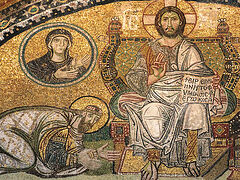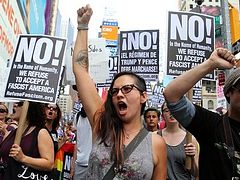For I bear them witness that they have a zeal for God, but it is not enlightened. For they being ignorant of God’s righteousness, and seeking to establish their own righteousness, have not submitted to the righteousness of God. (Romans 10:2-3)
Having a zeal which is not enlightened (or not according to knowledge as some translate the verse) seems to me to be an appropriate description of the ideologues who want to run (= ruin) American politics. They demand absolute allegiance to their ideas and ideologies, no matter how that might affect people. I remember an elderly Russian couple, having escaped from the atheistic, communistic Soviet Union, always said that communists are not human. That comment always puzzled me for I thought, but they are human, whatever else they might be. Over time I realized what they meant was that the communists they knew were such ideologues that they were willing to sacrifice countless human lives in order for their ideology to succeed. They believed they would create a better world for humanity, but first had to eliminate (murder, enslave, imprison) a huge portion of humanity – the end justified the means. Dictatorship and tyranny were justified as a means to the end. It seems to me today that the extremists on the right and left in America have the same attitude. They want to eliminate the opposition in order to create their idea of a perfect society, caring nothing for how much they make their opponents (including children) suffer since that will bring about their desired goal. St Paul tells us Christians: Do not be overcome by evil, but overcome evil with good (Romans 12:21).
Orthodox theologian Olivier Clement offers us a far more Christian vision of what role Christians have in society. It is a vision that offers a threat of danger—but only to our self in the form of martyrdom. It is a vision with the wisdom of questions about how to accomplish it while imitating Christ.
“Our cities desperately need the presence of Christians, enlivened by hope and intent on freedom; when they have studied the workings of society, like everyone else, they must make it their sole task to permeate its density with an unquenchable desire for communion. Fedorov said, ‘Our social programme is the Trinity; everything else is society in decay.’ In this enterprise there can be no conflict between the insistence on fair dealing, the setting up of model communities and the reform of society; the last after all simply means that we house, clothe and feed, as we are bound to do, the ‘thou’ who is our neighbor, all over the world. When St John Chrysostom began to preach the ‘sacrament of the brother’, he conceived the idea of reorganizing the society of Antioch in such a way that poverty would be abolished. But society is an aspect of the person, not the other way round, and however ethical the social institutions are, they are of no value unless they are created by and for persons. . .
[Clement’s point should be noted: Society is an aspect of the person—society is made for the human, not the human for society. Ideologues set up their vision of society—conservative, progressive, whatever—and then endeavor to force people to conform to their vision (eliminating those who don't), rather than valuing people and forming ideas that serve one’s neighbor as one’s self.]
“The theologians of violence forget the Beatitudes. The theologians of non-violence forget that history consists of tragedies. But amongst the violence of history, it is the duty of Christians to manifest the love of enemies, which is the strength of Christ himself. The love of enemies, exercised in the most extreme circumstances, is the only cure for our political neurosis, the desire to escape one’s own death while projecting it on to the enemy; and the cure begins with me. Only thus shall we achieve a life that is creative and free. . .”
[Again, Clement’s thought is so important. First he acknowledges that both those comfortable with the use of violence and those who oppose the use of violence have problems to deal with in the world. He appeals to following Christ—let love be our guide in all we do, and that only begins with “me”, not with any ideology. I just appreciate that he points out that both sides of this debate face difficult problems in living their vision. We still need to make Christ central to our thought and actions and that will not give us any easy solution.]
“It is the Church’s business not to impose methods, even non-violent ones, but to witness in season and out of season to the creative power of love. The problem is not one of violence or non-violence at all; and the solution, which can never be more than partial, lies in the ability to transform, as far as possible and in every circumstance of history, destructive violence into creative power. The cross which, as Berdyaev memorably said, causes the rose of worldly existence to bloom afresh, here signifies not resignation, but service; not weakness, but creative activity.”
[What Christians have to bring to any political discussion is the cross—first, Christ’s as contemplate what His sacrifice on the cross means for the current situation. Second, our own cross, for only by taking it up can we follow Christ in every political discussion or decision.]
“At the heart of Christianity is the tendency to desacralize power in order to sanctify it through the person who exercises it” (On Human Being, pp 102-103).
[A Christian having the responsibility of power must always remember Christ’s words about power and His showing His glory on the cross. The power a leader wields is not sacred, but the leader can make the office holy by following Christ. If we think power is sacred, we will use, abuse and sacrifice people. When we remember Christ came to save sinners, not proclaim an ideology, we look upon people as sacred and that realize power is a servant.]




